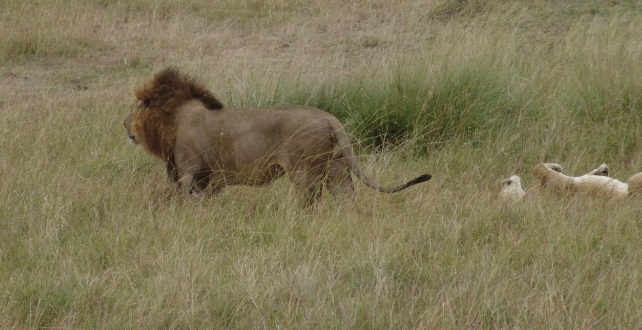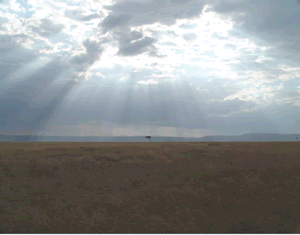
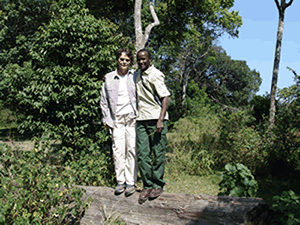
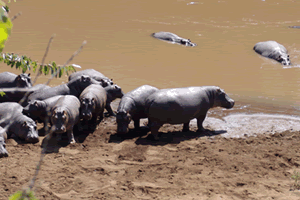
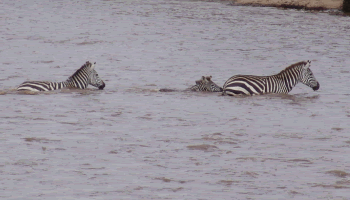
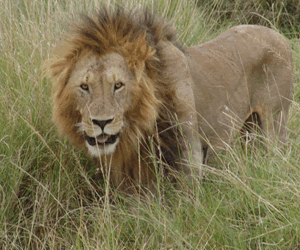
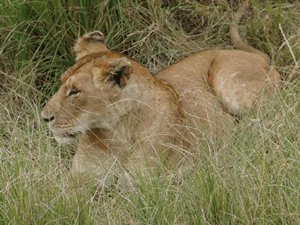
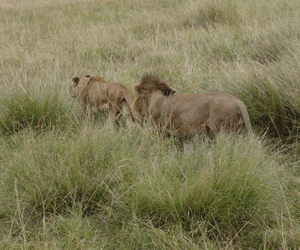
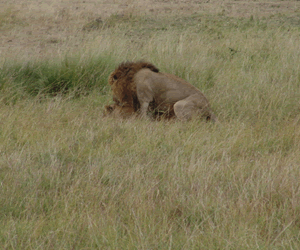
Richard’s Camp
All travel is a religious experience.
The tall grass surrounded the dark green Land Cruiser as it dipped from rut to rut like a rowboat in a yellow sea. “A large lion was seen here yesterday,” said K’taw. “A male.”
Sunlight streamed down from holes in pewter colored clouds, barely illuminating a lone flat-topped acacia on the black horizon. We couldn’t find the lion. K’taw turned off the engine. “How long has it been since you’ve seen your family?” Nell asked K’taw.
“Several months,” he said
“Do you miss them?”
“Oh yes.”
“Who takes care of them when you’re away?”
“My village. My village helps them.”
Masai Mara means the land of the Masai, and it is the northern most part of the Serengeti as it stretches into Kenya . In the early morning the dry grass has little odor and the cool breeze is also dry. You can smell animals, and the grass around the land Cruiser smelled of lion. I opened a fresh water bottle and drank. The water was still cold from the night air and I offered the bottle to Nell and she drank and gave it to K’taw. We were quiet, and sat, and looked across the Mara as the sun burned away the clouds and brightened the air. Insects warmed and started to move.
K’taw asked Nell where she had grown-up and she told him she was raised in an orphanage. He didn’t know what an orphanage was and couldn’t understand why she didn’t have family or a village to take care of her. He said it is impossible to live without family and village even if you are strong and adult. His family and village allowed him to be away for long periods: it salved his loneliness and anchored his being. I listened to him and said nothing and thought of how we hold on to the little remnants of family left to us. K’taw with his solid connectedness and Nell with her disconnectedness, struggled to understand each other. As they spoke she leaned forward to him, and he to her. They explored each other’s loneliness and pain like children turning over stones and comparing what they find.
“Perhaps we should come back later,” K’taw finally said. “Let’s go to the Mara River and see if the migration has started.” We left the tall grass and found the two-track and reached the river by mid-morning. It was hot and thousands of wildebeests and zebra were walking toward the river in thin columns snaking around termite mounds and low shrubs. Those that reached the muddy brown water stopped at the edge and resisted being driven in by the steady flow of animals massing behind them. The noise from grunting wildebeests and braying, kicking, zebras was continuous and very loud. The Land Cruiser was engulfed by them and we sat in a sea of animals driven to the river by ancient urges. Dust congealed in low hanging clouds as those at the river’s edge fought to remain on land; they had good reason for caution, they had to cross four hundred feet of crocodile laced shoulder deep water. Nile crocodiles are big, very big – some over twenty feet long had been sunning on the far riverbank and slid across the mud into the river as we and the animals approached.
Hippos were also in the river, but the animals took no notice of them. All but the youngest zebra knew some of them were not to make it across this morning --- they even counted on that happening --- because those had to be sacrificed so the rest could cross safely. There was a toll to pay: the crocs must be fed. As for the wildebeests, they were too stupid to know what awaited them. I told K’taw that Kennedy John called wildebeests wildeburger because they were so dumb and easy for lions to kill. K’taw laughed and agreed.
There was no way to determine what started it, but a zebra jumped from the riverbank to a large flat rock just off shore, and then plunged into the river and started across. It was a trigger; first tens, then hundreds, and then thousands of zebra and wildebeests jumped, slid, and fell into the river and headed for the far shore. Crocs cruised on the fringes of the swimming animal mass and picked off the closest ones. A wildebeest was the first to be taken when a croc grabbed its neck and pulled in underwater and flipped it over so the ungulate’s legs splayed and kicked in the air. The crock submerged and drowned the wildebeest and wedged it below the surface under rocks or a log. Crocs don’t have the proper teeth to chew, so they let their prey rot underwater until its soft enough to tear of and swallow large chunks. So the crocks were not eating what they killed right away – they were putting their victims away for another day.
The river was a roiling mass of zebra and wildebeests and crocs, when suddenly I saw several zebra that had made it across, turn around and head back across the river. “Why in the world would they do that?” I asked K’taw. Just watch, he said, just watch. When they got back to where they started, they met a baby zebra that just entered the water. They surrounded it and escorted it toward the middle of the river when the current caught the baby and pulled it downstream from its escorts towards the crocks. Several crocks took note and headed for the baby like half-submerged submarines. The baby fought the current but the water lapped its face and the current was very strong. We were a good distance from the baby, but we still saw the terror in its large soft brown eyes. The baby hit a high spot in the river and was able to get on its feet and push itself toward the larger zebras that had stopped to wait. It made it back inside the protective cordon and finally got out on the far shore. “Zebras are very smart,” said K’taw.
We stayed until the last animals had crossed and then met up with another Land Cruised from Richard’s camp and drove to a high bluff overlooking the river. Crocs were sunning all along both banks and hippos were grunting and bellowing and carrying on in the water. Occasionally a large hippo would come on shore and covet a spot occupied by a croc – it would walk over to the reptile and nudge it repeatedly with its nose until the croc gave way and slid into the water. The staff set-up tables and placed bowls of salad and vegetables and dark yeasty breads on them. They also brought out a roasted leg of goat and we sat on folding chairs on the bluff and ate the food and drank Tusker beer and watched the crocs eat their victims and the hippos torment the crocs.
We finished lunch and decided to go back to the tall grass and look again for the lion. K’taw entered the grass as we did before and slowly maneuvered the Land Cruiser in ever decreasing circles. Then we saw them. The grass hid them so well that we almost drove over them. It was a large male and a large female and they were lying on their sides in the grass. I was sitting on top of the Land Cruiser, with my feet dangling inside the vehicle, and K’taw stopped and we were about five feet from the big black manned male. Something startled the male and he jumped to his feet and moved closer to us and K’taw started the engine and I said no, no don’t move. The male and I locked eyes and we both stood very still. “He’s magnificent,” Nell said.
At first I thought I couldn’t move because of fear. But I then realized it wasn’t fear that froze me, but that I was mesmerized. I felt my arms raise my camera and trip the shutter again and again and again. And he still stood there and I still stood there and there was no sound but I could smell his acrid sweet breath, and noticed little pieces of grass clinging from the strands of his mane.
The female got up and walked away from our vehicle – maybe about thirty feet – and the male broke eye contact with me and followed her. When he caught up with her he gently took the back of her neck in his large mouth and mounted her. They remained coupled for a half-minute and then he let her go and she turned over on her back and rolled and undulated in the grass. “Wasn’t that sweet?” Nell said. K’taw looked at her and said big males like that have been known to mate fifty times a day. Fifty times a day! I said. That’s pretty impressive by anyone’s standards.
